Being a content writer must be lucrative.
Open any job board and you’ll notice that content writers are in high demand.
Naturally, curiosity kicks in.
What does a content writer do? Is this a writing job that suits me?
If the idea of starting a career (or a side gig) writing content intrigues you, keep reading!
In this post, we’ll:
- explain what a content writer is,
- list the types of content they write (hint: not just blog posts),
- identify what makes a great freelance content writer, and
- provide a skills checklist to get you started.
Ready? First, let’s get grounded with a definition.

What is a Content Writer?
Content writers create written or visual digital content with the intention to engage, educate, and nurture relationships with online consumers. This new profession in content marketing blossomed and evolved in the past 30+ years.
Given that you’re a seasoned online consumer, you’re already familiar with the work of content writers. In fact, you’re reading a content writer’s work right now!
But (as we’ll see) a content writer’s job description isn’t limited to blogging.
What Does a Content Writer Do?
Here’s a not-so-secret marketing truth:
Savvy online business owners know that visitors who hang out on their websites are more likely to buy their products.
But attracting people to their websites is challenging for online businesses.
Here’s where content writing superheroes earn their capes.

Businesses hire content writers to create relevant, quality content that attracts their target audience and draws them to their site. They also recruit writers who specialize in scripting email campaigns and social media posts for subscribers and followers.
Most internet users are familiar with blog articles or social media posts, but content writing includes a diverse mix of content.
Web Content Types
Let’s take a look at some of these different types of content in action.
1. Blog Post or Article
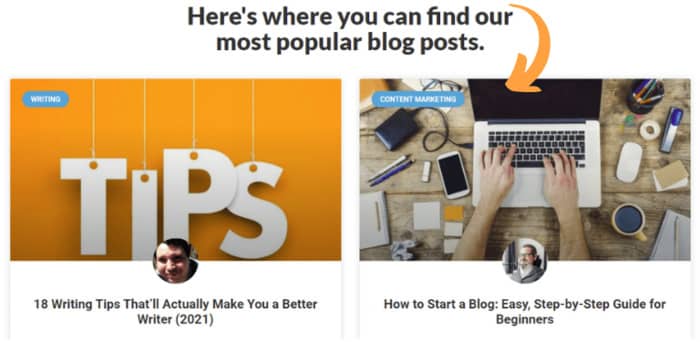
Smart Blogger has attracted over 4 million readers to their blog by publishing high-quality content that offers helpful tips for improving writing skills, earning an income as a blogger, and finding freelance writing jobs.
Well-written articles that include SEO (search engine optimization) enjoy free organic traffic to their websites from search engines.
But we’re getting ahead of ourselves. More on SEO content in a bit.
2. Web Page Copy

“Copy” and “copywriting” are terms used to describe written words that sell something. Web page copy is written for home pages, about pages, and web pages that sell products or services.
The copy on Smart Blogger’s about page connects with their target consumers by assuring that the products, information, and expertise found on this site will help them succeed as bloggers.
3. Landing Pages

A website landing page captures sales leads through visitor contact information.
Among several list-building tactics on the site, Smart Blogger’s home page flashes a full-screen opt-in prompt promising a free resource in exchange for providing your email address.
4. Podcast Scripts
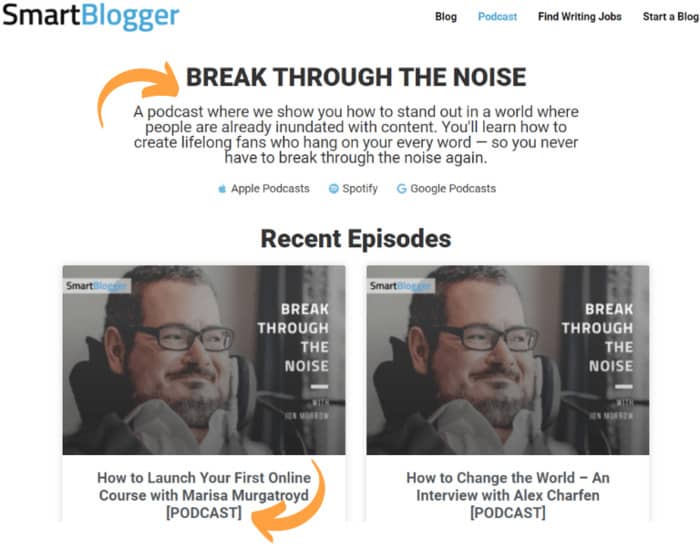
Podcasts are recorded audio files (or streamed live) that educate and entertain website followers.
Jon Morrow’s Break Through the Noise podcasts share interviews, information, and inspiration for the Smart Blogger target audience.
Jon always scripts his own podcast intros word for word, then does a detailed outline for the rest of the episode. (Not all podcasters are “Writer Extraordinaires” so they hire content writers to script their shows instead!).
5. Social Media Posts and Ads
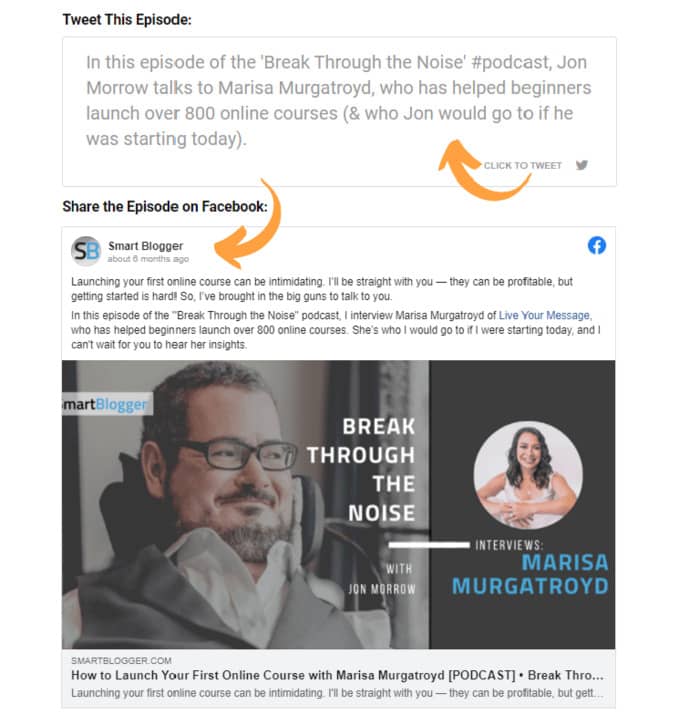
Smart Blogger taps into the conversational structure of social media to:
- build loyalty with their audience,
- grow their brand,
- promote their products, and
- drive visitors to their website.
Unlike press releases that follow a standard format, social media content experts structure their posts according to the unique marketing strategies for each platform.
6. Email Newsletters and Marketing Campaigns

Another way businesses stay connected with their prospects is through direct email.
For example, Smart Blogger uses email to send their list blog publication notices and new product campaigns.
Specialized, persuasive content writers called email marketing copywriters write product marketing email sequences.
7. Infographics
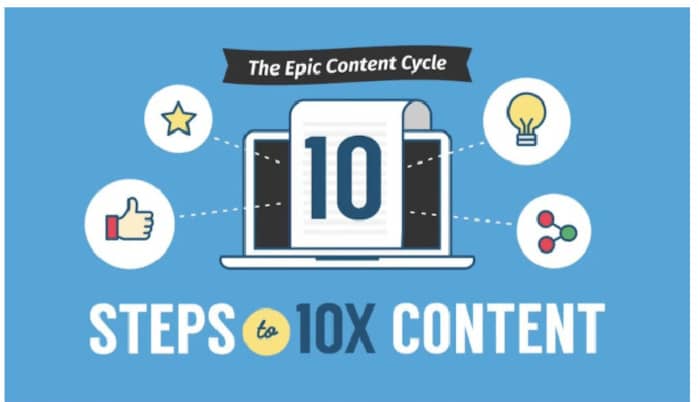
Infographics are visual informational summaries depicted with graphic illustrations and minimal text.
They’re perfect for expressing key points in an easy-to-digest presentation.
8. Ebooks and White Papers
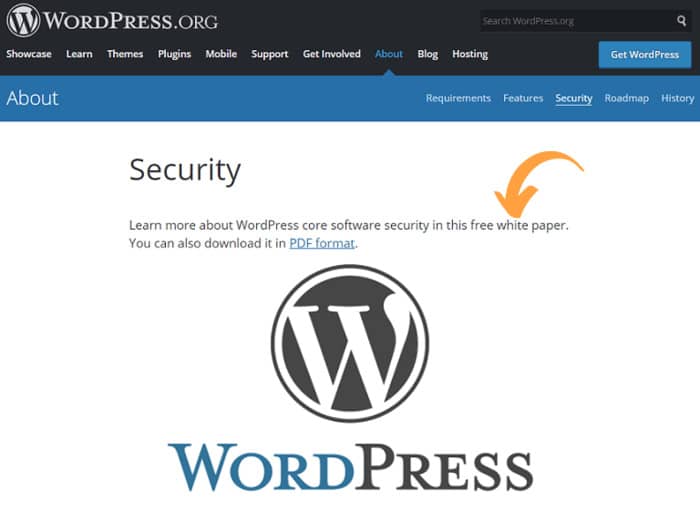
Subject matter experts or technical writers create longer-form digital content types like ebooks and white papers. B2B businesses often present these as lead generation tools.
Long-form content builds brand reputation while delivering beneficial, in-depth information for its readers.
9. Video Scripts
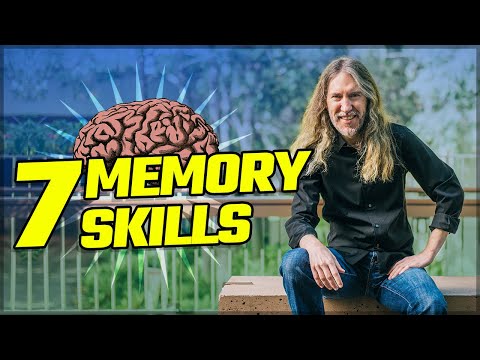
Explainer-type videos are attractive to most users because they are easy to consume. They’re effective for website owners because videos are shared more than long-form website content on social media.
Anthony Metivier combines engaging YouTube videos and long-form written content to reach his audience. (Compare the above video script with the written article, Top 10 Memory Skills to Power-Up Your Learning Potential.)
10. Product Descriptions
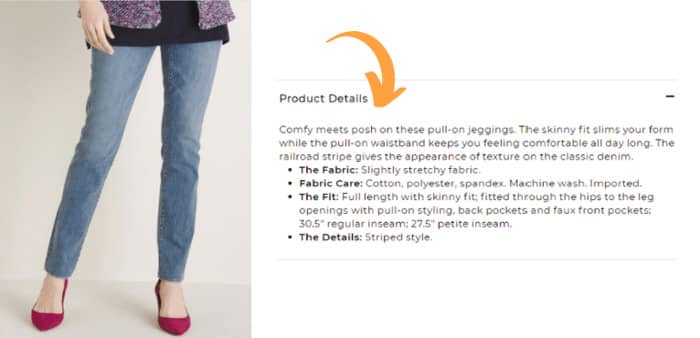
ECommerce copywriters compose detailed product descriptions to coax browsing shoppers to “add to cart”. Successful online product listings are optimized for search engines and focus on the benefits to the buyer.
What about you?
Does a certain content type jive with your writing style? How’d you like to get a sense of this kind of writing for a living?
Is Freelance Content Writing for Me?
In the next 20 years, online businesses will create an increased demand for content writers. Yet, 61% of online businesses who want to generate more sales leads say that their largest obstacle is the lack of resources.
Moonlighting freelancers who provide content writing services help bridge the gap between content marketing needs and staffing constraints (while keeping their day job)!
Online businesses need supplementary writers!
Ready to see if you have what it takes to dive into the successful content writer pool?
What Are the Qualities of Great Content Writers?
Great content writers share distinct qualities that help them refine their skills and produce effective online marketing content.
Qualities like:
- A Relatable Personality: While reflecting their own style and personality in their work, great content writers practice empathy in large doses (more in the next section) and treat their readers with respect.
- Adaptable: Content writers specialize in writing certain types of content, but they adjust their writing style to suit a particular topic or meet a client’s request.
- Integrity: Great content writers use their own words and credit the work of others. Readers trust their words and clients trust their work ethic.
- Perseverance: Great content writers show up, rain or shine. They power through writer’s block and learn new concepts and skills.
What Skills Are Needed by Content Writers?
Successful content writers acquire and develop professional skills and expertise throughout their careers.
Let’s check off their top skills, starting with the obvious.
1. A Way With Words
Content writers combine writing basics like proper sentence structure, grammar, and spelling with minimal filler words, flowing transitions, and powerful words that keep their readers… reading!
Not surprising, right?
Content writers have an extra obligation to hold the attention of readers (a.k.a. prospective consumers) with clear and concise writing that flows from one topic to the next.
2. Self-Editing

Content writers’ submissions should be error-free to avoid burdening clients with re-works or major revisions.
An important step in the writing cycle, content writers check their work for spelling or grammar goofs and assure that their text conforms to their client’s writer guidelines. As part of the proofreading process, writers often use no-cost or paid subscription grammar checkers.
3. Mind-Reading (Empathy)
Successful content writers know their audience. They know their thoughts, their pain, and their problems.
Telepathic?
No.
Even better: Empathetic.
They focus on and connect with their audience’s point of view, and guide their audience to helpful solutions. Content writers use this empathetic mindset to attract and keep readers in their targeted audience.
4. SEO Savvy
SEO strategists study how Google discovers and ranks articles based on many factors such as keyword research, search intent and backlinks.
Blog content writers optimize their articles to encourage Google to display it on the first page of search results, directing free organic traffic to the publishing website.
Social media content writers use similar skills to increase social media reach also providing opportunities to capture sales leads.
5. Research Skills

Even though some writers concentrate on one niche, content writers boost their topical knowledge by researching key material before writing a post’s first paragraph.
Their ability to gather, organize, and present findings from research adds value to their original content and boosts the credibility of the publishing website.
6. Computer Literacy Skills
This may scare some writers, but it shouldn’t.
After all, it’s only logical that digital content writers are familiar with digital technology.
Content writers should know computer basics like how to navigate online, retrieve and send an email, how to add a hyperlink in text, and use collaborative online word processors like Google Docs.
And don’t sweat it, more advanced skills like editing in WordPress or HTML coding can be learned along the way.
7. Time Management & Communication
Self-managed freelance writers practice good business skills.
Good time management skills help them meet deadlines. Attentive communication skills (like setting content creation expectations with a project manager) help to maintain good client relationships.
Sound like your kind of fun?
Our WRITER-acronym tips will kick your professional content writer career into gear.
How to Get Started As A Content Writer
Millions of writers have become full-time and part-time freelance content writers. You can too!
Here’s how:
Write daily. Journal with a writing prompt and or select a creative writing exercise and go for it!
Read and read some more to improve your writing. Read about mastering your craft and freelance writing.
Invest some time into learning some basic SEO strategies. Then learn more.
Take a class. Find a training course, templates, and informational material on Smart Blogger’s website.
Explore and experiment with writing different types of content. You’ll find that you prefer (and have a knack for) one over another.
Rinse and repeat. Build a portfolio of work and find your first client!
Become an Awesome Content Writer
Quality content is in demand.
Whether you’re writing content for your own business or someone else’s, you’ll need the skills of a good content writer. Someone who can effectively guide and engage readers who are anxiously seeking solutions to their problems.
Are you ready to create awesome content that will help those readers?
Now you know what it takes.
Learn and practice. Practice and learn.
Start today and you’ll be publishing great content before you know it!



